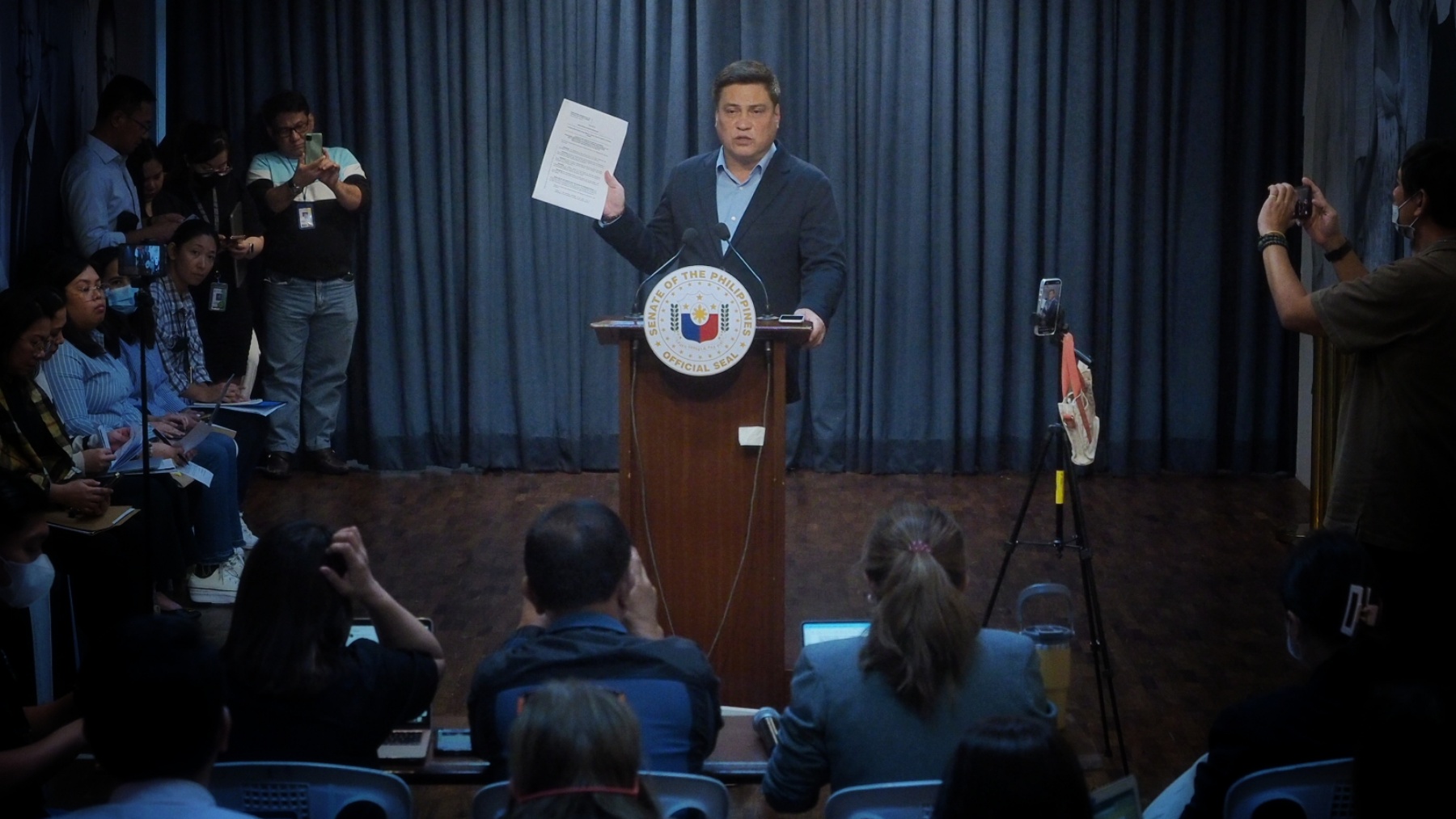Senators hail Zubiri for defending the Senate, filing reso on amending economic Constitutional provisions
Senators on Tuesday, January 16 expressed their support to Senate President Juan Miguel “Migz” Zubiri for leading the filing a Senate resolution that seeks to pursue amendments to the 1987 Constitution, but only limited to revisions in its economic provisions.

Senate President Juan Miguel "Migz" Zubiri shows reporters a copy of the Resolution of Both Houses No. 6 proposing amendments to certain economic provisions of the 1987 Constitution, particularly on Articles XII, XIV, and XVI. The resolution was signed by Zubiri, Senate President Pro Tempore Loren Legarda, and Sen. Sonny Angara and was formally filed in the Senate on Monday, Jan. 15, 2024. (Senate PRIB Photo)
“I have taken the position for the longest time to support discussions on amending certain provisions of the Constitution that would lead us to fully realize the economic potential of the country,” Sen. Sherwin Gatchalian said.
“In certain industries, there are restrictions for foreign ownership. Currently, in the case of operation of public utilities, only up to 40% foreign ownership is allowed while for educational institutions, even partial foreign ownership is prohibited,” Gatchalian pointed out.
On Monday, January 15, Senate President Juan Miguel “Migz” Zubiri led the filing of Resolution of Both Houses No. 6 which seeks to institutionalize reforms laid down in the Public Service Act to liberalize certain industries, promote efficient service delivery and promote competition.
Apart from Zubiri, Senate President Pro Tempore Loren Legarda and Sen. Juan Edgardo “Sonny” Angara co-authored the measure.
Gatchalian earlier filed Resolution of Both Houses No.1, also in a bid to amend certain restrictive economic provisions.
He noted that despite the country’s strong economic growth, the economy is still characterized by constitutional restrictions such as limits to foreign equity in the ownership and operation of public utilities, educational institutions, mass media, and advertising.
“In certain industries, there are restrictions for foreign ownership. Currently, in the case of operation of public utilities, only up to 40% foreign ownership is allowed while for educational institutions, even partial foreign ownership is prohibited,” he said.
In order to sustain economic growth, Gatchalian said such restrictions must be amended as they have constrained foreign direct investments (FDIs).
Based on a 2020 OECD FDI Restrictive Index review, the Philippines is ranked as the third-most restrictive in terms of FDI among 84 member countries of the Organisation for Economic Cooperation and Development (OECD).
“The innovations generated from competition and development of new linkages with regional and global chains will improve the diversity of the Philippines’ foreign trade portfolio and ultimately increase worker productivity and thus will not only attract foreign investments but also enable local forms to progress, invest and expand to help contribute to inclusive and sustainable development,” Gatchalian said.
Sen. Juan Edgardo “Sonny” Angara, chairman of the Senate finance committee and the subcommittee on constitutional amendments, also welcomed President Marcos’ directive to the Senate to lead the review of the economic provisions of the 1987 Constitution.
“Now, it is still early and it is clear that the matter is only the economic provisions of the law and not the matter of the government system or terms, I think it is better to be clear,” Angara said in in an interview over Radio DZRH.
“Now, it is clear that this is only limited to the three provisions filed by Senate President Zubiri –and Senator (Loren) Legarda and myself—which are only in public services, in educational institutions and in advertising,” added Angara, who is also one of the authors of proposed RBH No. 6.
“Those are the only industries that can be somewhat liberalized or allow foreign corporations or individuals to enter here to increase opportunities for our countrymen,” he also said.
Sen. Francis Tolentino said he too is supportive of the measure that the Senate President has filed, but said he would suggest to also include the minerals in the West Philippine Sea when the Senate debates on the measure is taken up in plenary.
Sen. Imee Marcos, President Marcos’ sister, also welcomed the latest development as she continues to express her disappointment over attempts to railroad Charter change through a Peoples Initiative (PI).
Zubiri earlier highlighted the need to preserve the bicameral nature of legislation, following the directive of President Marcos who he said, agreed with the Senate that the proposed Peoples’ Initiative “was too divisive.”
“While we respect and recognize the people as our sovereign, with the right to call for Constitutional change, we must guard against any attempt to revise the Constitution by exploiting our democratic process under the guise of a people’s initiative,” Zubiri said i during Monday’s press conference at the Senate.
“The framers of the Constitution deliberately ensured that modifying it will be an arduous process, never to be taken lightly. We wish to assure the people that in reviewing the economic provisions of the Constitution, we will be circumspect. We are guided by the knowledge that our sovereign is watching, and that the work we do should represent no interest other than our people’s interest,” the Senate chief stressed.